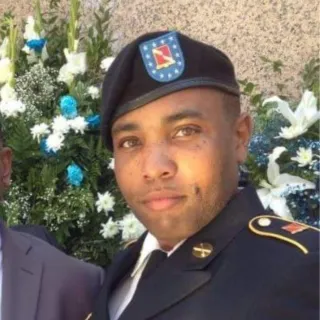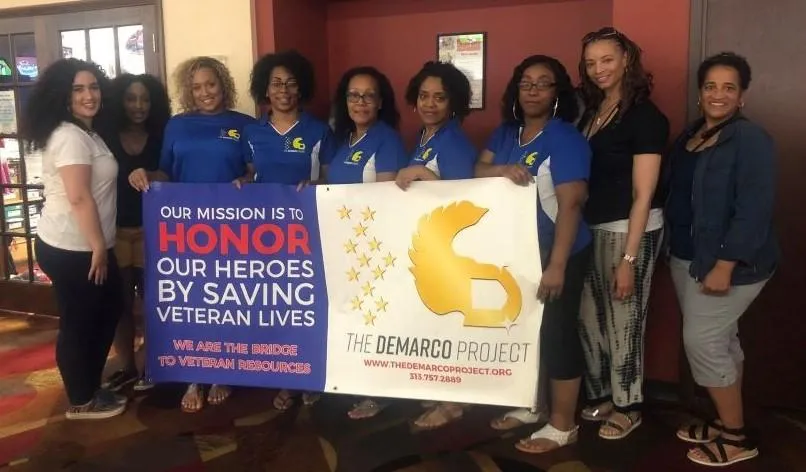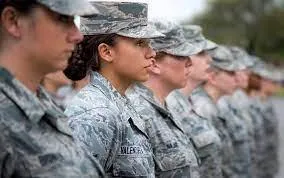It's our 8th anniversary and it's been our honor to serve veterans, service members, and their families.
Wounded Warrior
Project's Impact
As a nonprofit organization for veterans, WWP has tirelessly advocated for warriors and their families since 2003.

“The DeMarco Project’s Mission is to honor our heroes by saving Veteran lives through life transformation.”
The DeMarco Project
Kim J. Clark, Founder & Executive Director
MAKE AN IMPACT

By donating, fundraising, or spreading the word, you can help veterans and their families get back on track and become an active part of their communities.

FUNDRAISE
Host or participate in a fundraising initiative to help Veterans and their families recover, transition back, and thrive in civilian life. Together, we can make an impact.

SHARE
Help raise awareness by sharing inspirational stories with your friends and family. Our community, our Veterans, and their families are counting on us.
WHAT'S NEW AT THE DEMARCO PROJECT

Is The DeMarco Project a legal 501(c)(3) corporation?
Yes. The DeMarco Project is a non-profit 501(c)(3) established in April 2016. We are in good standing with the state of Michigan and the IRS. The organizations can legally accept financial and other donations (i.e., clothes, household items, personal care items, property, vehicles, etc.).

What populations do you serve?
The DeMarco Project serves veterans, their families, and youth (military and civilian). Please see our 'Veterans and Their Families' page for more details.

How does The DeMarco Project help veterans?
We help veterans with resources such as counseling, immediate needs (i.e., food, clothing, housing, medications, personal items, etc.), access to VA benefits, and more. Don't hesitate to get in touch with us for details.

I'm getting discharged in a few months and need help getting housing. I don't want to stay with my family. Can you help me?
The DeMarco Project can assist you with connecting to resources before you leave the military. Please reach out to us for more information.

I'm a veteran who often thinks it would be best for everyone if I weren't here. I want the noise in my head to stop. I don't want to leave my family with that legacy.
Thank you for reaching out to us. We understand. Call us at (313)777-8072. Kim, DeMarco's mother, will personally assist you by connecting you with one of our counselors who will most help you with your situation. That counselor will be a veteran or a counselor with extensive experience with counseling veterans who struggle with suicidal ideation and other challenges. We will ensure you are connected with a veteran comrade who will walk you through your healing process. For immediate assistance, contact the National Suicide Prevention hotline at 1.800.273.8255.Please be aware our licensed and credentialed counselors follow a strict code of ethics that ensures each veteran's information is kept in the strictest confidence unless there is a duty to warn to save a life. The duty to warn is a legal and ethical requirement of all licensed practitioners.


“Purple Up! For Military Kids” – Celebrate Military Children
In 1986, Secretary of Defense Caspar W. Weinberger designated April as “The Month of the Military Child”. ...more
TheDeMarcoProject
May 29, 2019•4 min read

Expanding Love’s Compassion for Mothers
The thought of writing about Mother’s Day was a very difficult task for me. In my mind, every day that a woman embraces all of the roles she must fulfill during the course of a day is Mother’s Day. Th... ...more
TheDeMarcoProject
May 28, 2019•4 min read

People of Color in Our Military History
In this article, we are showcasing a few individuals who did their part to help shape this great nation by being willing to put their lives on the line. ...more
TheDeMarcoProject
May 25, 2019•4 min read

Confident Young Leader Interview with JROTC Cadet Lieutenant Colonel LaShaun Wilkerson
Throughout 2019 The “DeMarco Projects Speaks” will showcase phenomenal young people who this writer has had the privilege of meeting through the JROTC. ...more
TheDeMarcoProject
May 25, 2019•4 min read

Military Families Give the Ultimate Gift
This military parent is inviting you to honor and acknowledge those who have kept our borders safe. ...more
TheDeMarcoProject
May 25, 2019•3 min read

Our Future is in Good Hands Interview with JROTC Cadet Captain Tre’Neka Mitchell
The fact of the matter is, our young people are eager to shine, put their best foot forward and lead with certainty. ...more
TheDeMarcoProject
May 25, 2019•4 min read
“The DeMarco Project’s Mission is to honor our heroes by saving Veteran lives through life transformation.”
The DeMarco Project
Kim J. Clark, Founder & Executive Director

GET INVOLVED WITH THE DEMARCO PROJECT
Sign up for our email newsletter and get the latest info on events, fundraisers, and ways to make an impact.
ABOUT US
Board of Directors
FAQs
SUPPORT
Support Our Partners
CONNECT WITH US
© 2025 The DeMarco Project | Privacy Policy | Terms of Use
The DeMarco Project is a tax-exempt 501(C)(3) nonprofit organization.








